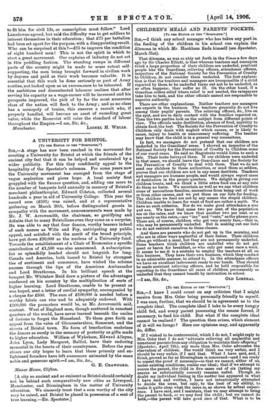A UNIVERSITY FOR BRISTOL.
(To THE EDITOR OF THE "SpEcTATos."1 SIR,—A stage has now been reached in the movement for creating a University for Bristol at which the friends of the ancient city feel that it can be helped and accelerated by a wider publicity. For this they confidently appeal to the hospitality of the Spectator's columns. For some years now the University movement has emerged from the stage of vague aspiration and pions hope. A local society first grappled with the finance question, and, adding one more to the number of banquets held annually in memory of Bristol's merchant philanthropist, Edward Colston, collected several hundreds a year in aid of University College. This year the record sum (2591) was raised, and at a representative gathering on March 30th, before distinguished guests in sympathy with the movement, announcements were made by Mr. J. W. Arrowsmitb, the chairman, so gratifying and definite that to many Bristolians even they came as a surprise. He was able to say that four donors, worthy bearers indeed of such names as Wills and Fry, anticipating any public appeal, and satisfied with the merit of the broad principle, have put down £30,000 as the nucleus of a University fund. Towards the establishment of a Chair of Economics a specific contribution of £1,500 was also announced. A subscription list so splendidly headed should not languish for long. Canada and America, both bound to Bristol by strongest ties of sentiment and commerce, have wished the scheme success through the lips of the American Ambassador and Lord Strathcona. In his brilliant speech at the banquet Mr. Whitelaw Reid drew a picture of the advantages conferred on his country by the multiplication of seats of higher learning. Lord Strathcona, unable to be present as was hoped, sent a letter of cordial sympathy, accompanied by a cheque for £500. The sum of 2100,000 is needed before a worthy fabric can rise and be adequately endowed. With £200,000 the promoters would be, as Mr. Arrowsmith said, content. West of England men, though scattered in remotest quarters of the world, have never learned beneath the smiles of fortune to forget the Homeland. To them goes forth an appeal from the vales of Gloucestershire, Somerset, and the streets of Bristol town. No form of benefaction enshrines the donors so surely in the memory of posterity as gifts made to higher education. William of Wykeham, Edward Alleyne, John Lyon, Lady Margaret, Balliol, have their enduring memorial in the hearts of their countrymen. Before the year closes our city hopes to learn that these princely and en- lightened founders have left successors animated by the same noble and generous spirit.—I am, Sir, &c., [A city so ancient and so eminent as Bristol should certainly not be behind such comparatively new cities as Liverpool, Manchester, and Birmingham in the matter of University education. We sincerely trust that a sum worthy of the city may be raised, and Bristol be placed in possession of a seat of true learning.—En. Spectator.]






































 Previous page
Previous page